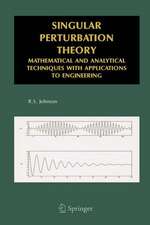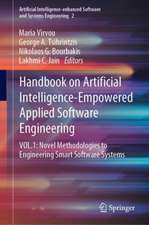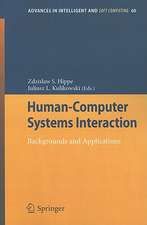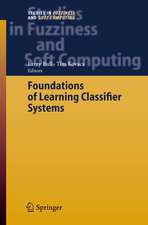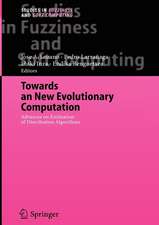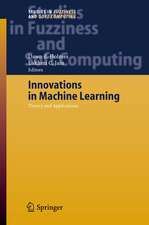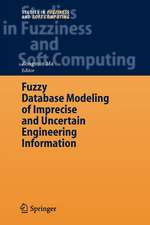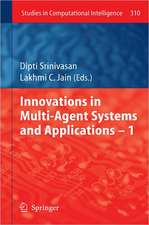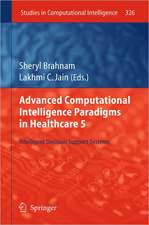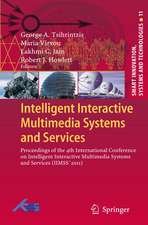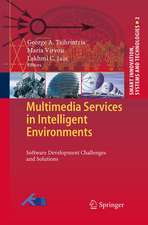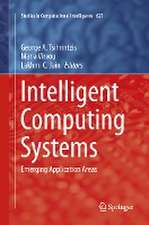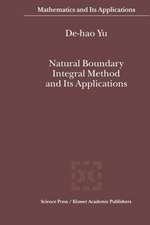Computational Intelligence Paradigms: Innovative Applications: Studies in Computational Intelligence, cartea 137
Editat de Mika Sato-Ilic, Maria Virvou, George A Tsihrintzis, Valentina Emilia Balas, Canicious Abeynayakeen Limba Engleză Hardback – 14 iun 2008
The book includes a sample of research on the innovative applications of advanced computational intelligence paradigms. The characteristics of computational intelligence paradigms such as learning, generalization based on learned knowledge, knowledge extraction from imprecise and incomplete data are the extremely important for the implementation of intelligent machines. The chapters include architectures of computational intelligence paradigms, knowledge discovery, pattern classification, clusters, support vector machines and gene linkage analysis. We believe that the research on computational intelligence will simulate great interest among designers and researchers of complex systems. It is important to use the fusion of various constituents of computational intelligence to offset the demerits of one paradigm by the merits of another.
| Toate formatele și edițiile | Preț | Express |
|---|---|---|
| Paperback (1) | 640.24 lei 6-8 săpt. | |
| Springer Berlin, Heidelberg – 30 noi 2010 | 640.24 lei 6-8 săpt. | |
| Hardback (1) | 646.43 lei 6-8 săpt. | |
| Springer Berlin, Heidelberg – 14 iun 2008 | 646.43 lei 6-8 săpt. |
Din seria Studies in Computational Intelligence
- 50%
 Preț: 264.48 lei
Preț: 264.48 lei - 20%
 Preț: 1158.26 lei
Preț: 1158.26 lei - 20%
 Preț: 986.66 lei
Preț: 986.66 lei - 20%
 Preț: 1452.76 lei
Preț: 1452.76 lei - 20%
 Preț: 168.78 lei
Preț: 168.78 lei - 18%
 Preț: 1112.30 lei
Preț: 1112.30 lei - 20%
 Preț: 565.38 lei
Preț: 565.38 lei - 20%
 Preț: 649.28 lei
Preț: 649.28 lei - 20%
 Preț: 1047.73 lei
Preț: 1047.73 lei - 20%
 Preț: 1578.96 lei
Preț: 1578.96 lei - 20%
 Preț: 643.50 lei
Preț: 643.50 lei - 20%
 Preț: 657.49 lei
Preț: 657.49 lei - 20%
 Preț: 993.28 lei
Preț: 993.28 lei - 20%
 Preț: 990.80 lei
Preț: 990.80 lei - 20%
 Preț: 989.96 lei
Preț: 989.96 lei - 20%
 Preț: 1165.69 lei
Preț: 1165.69 lei - 20%
 Preț: 1444.52 lei
Preț: 1444.52 lei - 20%
 Preț: 1041.96 lei
Preț: 1041.96 lei - 20%
 Preț: 1047.73 lei
Preț: 1047.73 lei - 20%
 Preț: 1046.06 lei
Preț: 1046.06 lei - 18%
 Preț: 2500.50 lei
Preț: 2500.50 lei - 20%
 Preț: 989.13 lei
Preț: 989.13 lei - 20%
 Preț: 1165.69 lei
Preț: 1165.69 lei - 20%
 Preț: 1164.05 lei
Preț: 1164.05 lei - 20%
 Preț: 1042.79 lei
Preț: 1042.79 lei - 20%
 Preț: 1460.19 lei
Preț: 1460.19 lei - 18%
 Preț: 1403.52 lei
Preț: 1403.52 lei - 18%
 Preț: 1124.92 lei
Preț: 1124.92 lei - 20%
 Preț: 1039.47 lei
Preț: 1039.47 lei - 20%
 Preț: 1008.11 lei
Preț: 1008.11 lei - 20%
 Preț: 1045.25 lei
Preț: 1045.25 lei - 20%
 Preț: 1275.42 lei
Preț: 1275.42 lei - 20%
 Preț: 1040.32 lei
Preț: 1040.32 lei - 20%
 Preț: 988.32 lei
Preț: 988.32 lei - 20%
 Preț: 1169.79 lei
Preț: 1169.79 lei - 20%
 Preț: 1162.37 lei
Preț: 1162.37 lei - 20%
 Preț: 1059.26 lei
Preț: 1059.26 lei - 20%
 Preț: 1164.05 lei
Preț: 1164.05 lei - 20%
 Preț: 1166.52 lei
Preț: 1166.52 lei - 20%
 Preț: 1459.38 lei
Preț: 1459.38 lei - 18%
 Preț: 1005.74 lei
Preț: 1005.74 lei - 20%
 Preț: 997.38 lei
Preț: 997.38 lei - 20%
 Preț: 1055.94 lei
Preț: 1055.94 lei - 20%
 Preț: 1284.47 lei
Preț: 1284.47 lei - 20%
 Preț: 994.08 lei
Preț: 994.08 lei - 20%
 Preț: 1048.72 lei
Preț: 1048.72 lei - 20%
 Preț: 1066.02 lei
Preț: 1066.02 lei - 20%
 Preț: 943.78 lei
Preț: 943.78 lei - 20%
 Preț: 1173.10 lei
Preț: 1173.10 lei - 20%
 Preț: 1457.72 lei
Preț: 1457.72 lei
Preț: 646.43 lei
Preț vechi: 760.50 lei
-15% Nou
Puncte Express: 970
Preț estimativ în valută:
123.73€ • 129.99$ • 103.99£
123.73€ • 129.99$ • 103.99£
Carte tipărită la comandă
Livrare economică 11-25 martie
Preluare comenzi: 021 569.72.76
Specificații
ISBN-13: 9783540794738
ISBN-10: 3540794735
Pagini: 292
Ilustrații: VIII, 281 p.
Dimensiuni: 156 x 234 x 20 mm
Greutate: 0.59 kg
Ediția:2008
Editura: Springer Berlin, Heidelberg
Colecția Springer
Seria Studies in Computational Intelligence
Locul publicării:Berlin, Heidelberg, Germany
ISBN-10: 3540794735
Pagini: 292
Ilustrații: VIII, 281 p.
Dimensiuni: 156 x 234 x 20 mm
Greutate: 0.59 kg
Ediția:2008
Editura: Springer Berlin, Heidelberg
Colecția Springer
Seria Studies in Computational Intelligence
Locul publicării:Berlin, Heidelberg, Germany
Public țintă
ResearchCuprins
An Introduction to Computational Intelligence Paradigms.- A Quest for Adaptable and Interpretable Architectures of Computational Intelligence.- MembershipMap: A Data Transformation for Knowledge Discovery Based on Granulation and Fuzzy Membership Aggregation.- Advanced Developments and Applications of the Fuzzy ARTMAP Neural Network in Pattern Classification.- Large Margin Methods for Structured Output Prediction.- Ensemble MLP Classifier Design.- Functional Principal Points and Functional Cluster Analysis.- Clustering with Size Constraints.- Cluster Validating Techniques in the Presence of Duplicates.- Fuzzy Blocking Regression Models.- Support Vector Machines and Features for Environment Perception in Mobile Robotics.- Linkage Analysis in Genetic Algorithms.
Textul de pe ultima copertă
System designers are faced with a large set of data which has to be analysed and processed efficiently. Advanced computational intelligence paradigms present tremendous advantages by offering capabilities such as learning, generalisation and robustness. These capabilities help in designing complex systems which are intelligent and robust.
The book includes a sample of research on the innovative applications of advanced computational intelligence paradigms. The characteristics of computational intelligence paradigms such as learning, generalization based on learned knowledge, knowledge extraction from imprecise and incomplete data are the extremely important for the implementation of intelligent machines. The chapters include architectures of computational intelligence paradigms, knowledge discovery, pattern classification, clusters, support vector machines and gene linkage analysis. We believe that the research on computational intelligence will simulate great interest among designers and researchers of complex systems. It is important to use the fusion of various constituents of computational intelligence to offset the demerits of one paradigm by the merits of another.
The book includes a sample of research on the innovative applications of advanced computational intelligence paradigms. The characteristics of computational intelligence paradigms such as learning, generalization based on learned knowledge, knowledge extraction from imprecise and incomplete data are the extremely important for the implementation of intelligent machines. The chapters include architectures of computational intelligence paradigms, knowledge discovery, pattern classification, clusters, support vector machines and gene linkage analysis. We believe that the research on computational intelligence will simulate great interest among designers and researchers of complex systems. It is important to use the fusion of various constituents of computational intelligence to offset the demerits of one paradigm by the merits of another.
Caracteristici
Presents innovative applications of advanced computational intelligence paradigms




